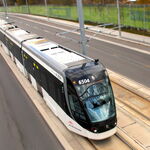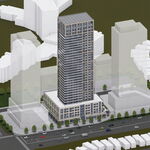hw621
Senior Member
^because they don't know about their schedule?
They don't have a PDF schedule for Viva like they do for the local routes. They haven't for years IIRC but I don't understand why.Does anyone know if YRT even still posts schedules for VIVA? Their website directs you to triplinx to plan your trip when you try to find an actual schedule. Super annoying.
Same for Markham. The city has poor bus service outside Viva Purple.^^
Brampton and Mississauga have many older areas and different demographics, such as more lower-income immigrants.
Of all the major metrolinx projects, only Viva has really delivered relatively on time and supposedly at/under budget. They should put their construction manager on the ECT extensions and Ontario line.Viva Bus Rapid Transit Segments Opening in Vaughan and Newmarket
VAUGHAN and NEWMARKET, January 3, 2020—To get people moving across York Region, two key rapidway segments will be opening in Vaughan and Newmarket on January 5, 2020.
In Vaughan, a new 5.5-kilometre stretch of the vivaNext rapidway project runs along Centre and Bathurst Streets to the Bathurst & Highway 7 Station, and in Newmarket, a 2.4-kilometre rapidway runs on Yonge Street from Savage Road / Sawmill Valley Drive to Davis Drive. These projects add upgraded utility infrastructure, seven new vivastations, wider sidewalks with decorative paver stones, newly planted trees and shrubbery and raised bike lanes.
On November 24, 2019, the western segment of the Highway 7 project opened from Bruce Street to Interchange Way / Edgeley Boulevard. In September 2019, the segment on Highway 7 from Bathurst to Richmond Hill Centre Terminal, including the Bathurst & Highway 7 Station, opened three months ahead of schedule. This announcement marks the completion in Vaughan of the design, build and finance project to deliver 12.6-kilometres of rapidway, 10 new stations, raised bike lanes, a multi-use path for cyclists and pedestrians over Highway 400 and a seamless connection to the Vaughan Metropolitan Centre Station.
This is part of the overall 22-kilometre rapidway network that stretches west to east through Vaughan, Richmond Hill and Markham, from Highway 7 and Bruce Street through to the Vaughan Metropolitan Centre, along Centre and Bathurst through to Richmond Hill Centre Terminal, and all the way to Warden Station on Enterprise Boulevard.
In Newmarket, this new stretch of rapidway on Yonge Street, links to the Davis Drive rapidway, making connections to the GO train station, bus routes and the Davis Drive and Highway 404 Park & Ride.
"Today marks an important milestone in York Region with the opening of these new transit projects that better connect our communities together," said Christine Elliott, MPP for Newmarket-Aurora. "Our government is making public transit more convenient, accessible and reliable as part of our plan to strengthen the economic future of this region and the province."
"Metrolinx is excited about the progress of this project with the opening of another two bus rapid transit segments," said Phil Verster, Metrolinx President and CEO. "These key connections to the existing rapidways in Newmarket, Vaughan, Richmond Hill and Markham, and the TTC Line 1 subway, will make getting where you need to go easier and more convenient."
"Transit remains a key priority for York Regional Council as we work with partners to deliver a well-planned network connecting to key destinations," said York Region Chairman and CEO Wayne Emmerson. "When transit works as an integrated system, everyone who lives, works and travels through the Region benefits from more convenient and reliable transportation options and employment opportunities."
"The opening of the newest vivaNext bus rapid transit project in the Bathurst and Centre Street area, as well as Highway 7 West, builds on our vision to improve streetscapes, upgrade utilities, enhance regional transit connectivity, and make our communities more accessible for everyone," said Maurizio Bevilacqua, Mayor, City of Vaughan.
"This is an important project that will support the development of growing York Region communities like ours, and benefit the local economy," said John Taylor, Mayor, Town of Newmarket. "Rapid transit in Newmarket helps ease congestion, reduces travel time for commuters, and builds a better future for our residents."
This first phase of the Viva bus rapidway network includes 34 kilometres of dedicated bus lanes along York Region’s main corridors and 38 new stations. These rapidways will make it easier to travel in and around York Region by improving travel times and service reliability, and will integrate with other transit services for better connectivity for those working, living and visiting in York Region.
The York Viva bus rapid transit project represents a $1.4 billion (2009$) transit investment from the Government of Ontario, and is part of Metrolinx’s Regional Transportation Plan, a 25-year plan for an integrated and sustainable transit and transportation system in the Greater Golden Horseshoe. The project is funded by Metrolinx, an agency of the Province of Ontario. Visit metrolinx.com for more information.
York Region Rapid Transit Corporation (YRRTC) is responsible for the planning, design and construction of the full vivaNext rapid transit network and related infrastructure to deliver on the transit priorities set out in the York Region Transportation Master Plan. YRRTC is a wholly-owned subsidiary and share capital corporation of The Regional Municipality of York. For more information, please visit vivanext.com.
Of all the major metrolinx projects, only Viva has really delivered relatively on time and supposedly at/under budget. They should put their construction manager on the ECT extensions and Ontario line.
IIRC, the delays were mostly caused by prolonged property acquisitions.They're only on-time if you only read the marketing wank they put out.
The project has taken a shockingly long amount of time and money considering that they have not had a huge number of underground utility relocations when compared to elsewhere, and the fact that they aren't even undergrounding the rest of them.
Dan
Of all the major metrolinx projects, only Viva has really delivered relatively on time and supposedly at/under budget. They should put their construction manager on the ECT extensions and Ontario line.
IIRC, the delays were mostly caused by prolonged property acquisitions.
have you seen what they have done? widening major arterial roads without major service disruptions imo is more tedious than making new row. They essentially built a new road within an existing one by widening it. They did build another storage facility near 16th ave and their row and stations are designed for future conversion to LRT. Regardless, their project goal times are realistic and when they said 2019, they delivered in 2019 with no constant delays. give them credit where its due instead of trying to find excuses to downplay every milestone. They wouldve completed all of this in 2017 as originally planned if it wasnt for the budget cuts by the liberals.Their projects are hilariously simple in comparison to LRT/Subway projects. No tunnelling, no elevation, very little if any construction of actual new roadway (unlike even the Mississauga Transitway), the "stations" are just a shelter with a canopy and not actual buildings by any real standard, no rails, no overhead, basic traffic signal work only and nothing like the railway crossing arms of say the Waterloo LRT, while there is utility relocation they're not doing things like building an LRT line directly above or below an actively operating subway or rebuilding/double-tracking an in-use GO station, and the rapidway projects by VivaNext involve no procurement of new buses/long term operation+maintenance contracts and no construction of operations maintenance and storage facilities.
They didnt start major construction on Bathurst until 2 years ago. Most of their resources were spent on hwy 7. You can clearly see the last year and a half was developing quicklyMaybe in a couple of cases, but certainly not as a blanket excuse.
It should not have taken them 3+ years to build a single lane ROW on Highway 7. Or almost 5 to build the section along Bathurst.
Dan
2019 was said a few years ago, but was far behind the initial schedule.have you seen what they have done? widening major arterial roads without major service disruptions imo is more tedious than making new row. They essentially built a new road within an existing one by widening it. They did build another storage facility near 16th ave and their row and stations are designed for future conversion to LRT. Regardless, their project goal times are realistic and when they said 2019, they delivered in 2019 with no constant delays. give them credit where its due instead of trying to find excuses to downplay every milestone. They wouldve completed all of this in 2017 as originally planned if it wasnt for the budget cuts by the liberals.
2015 wouldve have been achievable if it wasnt for the budget cuts. They were forced to spread out the schedule more iirc. The 12 year statement is a bit flawed as their plan was to phase it in. hwy 7 opened in 2011 ahead of schedule in fact. IMO for those who are comparing LRT vs BRT, laying track is the easy part. Widening the road for the ROW and utility relocation is the hard part at which they did a pretty good job at managing. I live near hwy 7 so I can tell first hand how it affected traffic which wasnt that bad vs the surface sections of the ECT. They only started major work on yonge st (major road work, not utility relocation) a few years ago and if they are completing it this year its fine. Whether itd be used heavily enough to satisfy the appetites of transit fanatics is irrelevant. They at least got things done in their stated timelines and relatively on budget, unlike ECT, YUSE, SSE.2019 was said a few years ago, but was far behind the initial schedule.
These projects were initially funded around 2008 I believe, along with Transit City. At the time the deadline was 2015 I think. 12 years to complete some bus lanes is agonizingly slow by any standards. And Yonge Street, the most important lanes, still aren't done.
Plus you have the whole issue of these lanes being way, way under-serviced.




